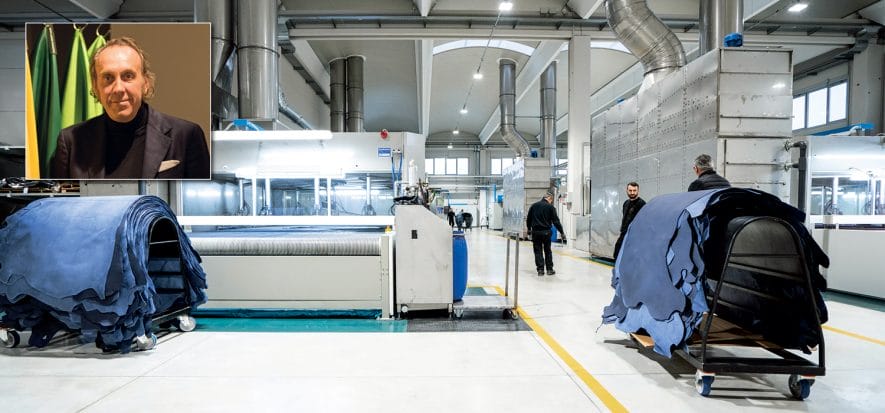We interviewed (as mentioned in the first lines of the text) Fabrizio Masoni, owner of Masoni Industria Conciaria, on February 19, 2020.
The day we meet Fabrizio Masoni and his wife Federica is the first of the last edition of Lineapelle. We are in Fieramilano Rho, it is February 19 of a year, 2020, which began with great hopes and, unfortunately, is about to sink into the drift of the Covid-19 emergency. What is perceived upon entering the booth of their tannery, is exactly what, shortly after, emerges from their words. Few frills, clear ideas, a real pride.
Brief summary of the company
Founded in 2001, Masoni Industria Conciaria, achieved a turnover of 47 million euros last year. A result that stems from a path of “continuous growth – explains Fabrizio Masoni – both in production and in turnover, despite a small slowdown last year”. A result that, together with a whole host of other reasons, led the Santa Croce sull’Arno tannery to sign a particularly significant agreement. Signed, thus entering the capital of Masoni as a minority shareholder, by French giant LVMH, historical customer of the Tuscan tannery. Our interview inevitably starts here.
How was this operation born and in what direction?
“I am proud that LVMH asked me to enter our capital. Proud that the company and our management are appreciated. And I am proud of the growth project that we drew together. We will make investments, which we have undertaken independently, for example by starting a new finishing in Castelfranco di Sotto in September, which allows us to increase production by 30-40%, going up to 65 employees. It was highly appreciated by the LVMH group that we made this choice regardless of their entry into the capital”.
How does the business management model change now?
“It does not change. The autonomy of business management remains the same. Our leathers will be sold to anyone who will give us the opportunity to use them in its collections. There is no forcing by LVMH brands, which represent around 20% of our turnover, to have special supplies in terms of price and quality. Of course, we have room to work harder, while maintaining all our historical customers”.
Does the Masoni-LVMH “project” also concern sustainability?
“Sure. I am absolutely convinced, however, that “sustainability” does not exist. I firmly believe that every company must find its dimension in this sense”.
What is yours?
“With LVMH, we are developing a very important project, regardless of the type of tanning, with and without chromium. But it is much wider than that. It concerns enhancing the purchase of suitable products, the use of clean energy, a water recycling system. Many small tricks, which go as far as the recent endowment for the company of an electric car fleet. A bit like when we went to school, as children, and they taught us that many small gestures, if we all do them, become huge gestures”.
A gesture of yours these days concerns the Coronavirus emergency: can you explain it to us?
“This situation impacts us now and will impact us in the future. If only for the fact that we sell leather to those who, in turn, sell accessories in Asia and China. All these customers sent the input to their production sites to slow down their stocks, rumours say around 30%. And this input has come down to us. So we decided to close on Friday. We work a little less, but we all work. As tanneries of present days, we need to work with a horizon that is no more than 6 months: at most it reaches 2 months. This emergency depends on how long it lasts. So, for now I have not limited the purchase of raw materials, but I have temporarily reduced the dyeing and the final stages”.
What does it mean to be a tanner today?
“We have always needed a particular passion in tannery. Every new leather you produce is a creature, and the greatest satisfaction is when, as happened here at Lineapelle, a customer you respect and who has experience and universal knowledge of the material, tells you: “This leather is wonderful”. The passion is needed in all jobs, but I know this particular one, and one of the reasons why I was very happy to start the synergy with LVMH lies in the fact that I love this job and I hope to pass on this way of being”.
How will tanneries change in the near future?
“In a 10 years time tanneries will be a completely different thing. And they will be much less in terms of their number. They will be completely traceable, managed by “doctors”, but the “real” ones will still make “the leather of great-grandparents”. That is: the winning tanneries will be those that will focus on quality, because there is never an end to low prices. Over the years, I have seen some of my competitors approaching customers with very low prices: in the end they hurt themselves. Because quality wins, and focusing on it, having to guarantee various and high standards of compliance, requires a cost and a company that does things well, as it should be. For us, the entry of a partner like LVMH represents in this sense a great responsibility, but also a great opportunity to invest in excellence”.











